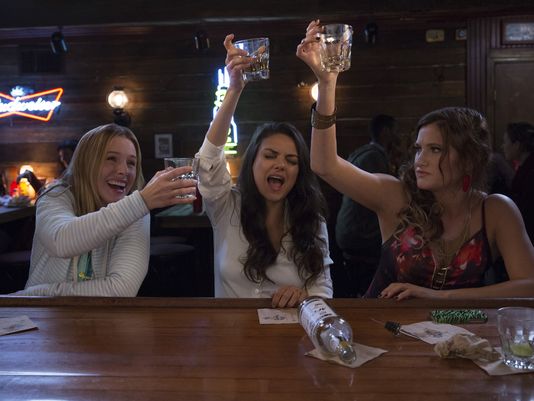In Bad Moms, three mothers in the suburbs of Chicago decide they’re sick of all the mom-competition, and vow to be bad mothers, giving their kids—and themselves—a break from the constant pressures they face in 21st century domestic life. Bad Moms offers an appealing, though obvious, message: We should be less frenetically obsessed with our children’s success, because it may actually be good for them to do things for themselves (even if it means failing at them for a while). (Shocker!)
The movie frames itself as a tribute to moms everywhere. (The closing credits even feature interviews with the film’s stars and their mothers, a movie which feels a bit calculated, even though it’s kind of sweet too.) And judging from the crowded theater in which I saw this movie—it was full of mostly middle-aged, middle-class women, many of them frequently bellowing happy affirmations at what happened on screen—Bad Moms resonates with its target audience. But as much as this movie wants to free moms from the pressures of perfectionism, Bad Moms never fully considers “moms” as human beings and as women. These women remain cartoonishly enslaved to maternity as an ideal, and so the film affirms what is ostensibly sets out to critique: the idea that women are nothing if they are not mothers.
Mila Kunis plays Amy, the main mom, who’s working at a hipster coffee company run by a slob in his 20s who declares a working holiday for his staff when a beloved character from Game of Thrones is killed off. (The film’s depiction of obnoxious millennials feels as flimsy and on-the-nose as last year’s The Intern.) Amy essentially has no self. She’s Mom. She shuttles her kids to school and soccer and music lessons, and she hustles to meetings, and she cooks dinner while her man-child husband is carrying on an online affair. Needless to say, Amy is due for a breaking point. She experiences it at the PTA meeting, where she challenges Gwendolyn, the tyrannical Mother-from-Hell (played by the delightful Christina Applegate), who asserts her superiority over all the other women at every opportunity, and keeps them all on a tight leash because she embodies what they think they want: perfection. But perfection comes at a cost, and Amy isn’t willing to pay it any more.
Kristen Bell and Kathryn Hahn complete the trio of moms who revolt against the tyrannical expectations of motherhood. Bell's Kiki has quite a brood of little monsters, and they’ve essentially sucked the life out of her. What’s more, Kiki’s husband is a self-involved jerk who expects her to do all the housework and parenting. Hahn’s character Carla, who’s already a “bad mom” (she’s divorced, sexually active, and says whatever pops into her head at any moment), sums Kiki up best: “Everything she says is like a cry for help.”
The idea of three women banding together against oppression has served movies well. (The 1980 classic 9 to 5 comes to mind.) But when Bad Moms’ idea of fighting oppression starts with three white, middle-class mothers wolfing down sugary cereal at the supermarket (because now when they go shopping, they’re gonna buy whatever they want, dammit!), something’s not quite right. The film has good intentions (who doesn’t agree that Moms work their asses off and get far too little appreciation for it?), but comedies don’t score points for good intentions. Fortunately, Bad Moms has the saving grace of Kathryn Hahn, whose performance is so deliriously over-the-top that she drags this movie into the naughty territory it’s otherwise afraid to enter. She’s constantly talking about jumping various men; she lovingly refers to her son as a “little shit”; and she expresses no interest in sitting through his baseball games: “The last one I went to lasted six hours and the score was 2 to 1.” She’s a woman who isn’t willing to give everything up just to be a mother.
Christina Applegate also deserves credit for making Bad Moms endurable. Applegate plays the Alpha-Mom with relish, and her character’s control over her own pack of mamas, played by Jada Pinkett-Smith and Annie Mumolo, is amusing. But the clash between Gwendolyn and Amy never fully works, perhaps because the movie spends so little time developing their relationship. Amy’s big speech about perfectionism feels strangely pre-mature; but it kicks off a rivalry between them because Amy announces her plans to run for PTA president. (As retaliation, and in order to keep the other mothers on her side, Gwendolyn throws a party for all the moms, catered by Martha Stewart, who’s their idol.)
Of course the film exaggerates a very real problem in our culture, in which women vie for power in the domestic sphere because it’s the only power available to them. But that’s where Bad Moms feels like a cop-out. It never challenges the order of things with any conviction. Even when Amy stops catering to her children’s every whim, she’s later reduced to apologizing for “neglecting” them. (But her son does learn how to make a frittata.)
Bad Moms isn’t all bad. It has funny moments, but it’s hard to rally behind it the way I can behind the deliciously reprehensible Bad Teacher. I don’t know what I would have done without Kathryn Hahn. Bad Moms is like a balloon with a hole in it, and Hahn is its never-ending supply of helium, constantly giving it momentary shape. Someone give this woman more leading roles.
With Jay Hernandez, David Walton, and in an amusing cameo as a marriage counselor, Wanda Sykes. Written and directed by Jon Lucas and Scott Moore.

No comments:
Post a Comment